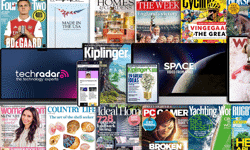How can an industry as big, competitive, complex and individualistic as magazines speak with a single voice to the outside world? And what does Vogue have in common with Angling Times as far as the consumer is concerned? These are some of the central challenges which have got in the way of past initiatives, but which are melting away as the pieces of the 2008 project come together ready for the Autumn campaign (29 September – 5 October).
What has galvanised the publishing business into collective action is the sheer intensity of the competition with other media, both in terms of the battle for consumer spend and time and of the need to defend and grow space in a retail market which is changing rapidly.
What is Magazine Week?
Magazine Week is an annual celebration of what makes the magazine medium unique. Its core focus is on the end reader and its objective is to stimulate trial of additional magazines among existing magazine buyers by doing three key things:
* Reminding consumers of what makes reading magazines so special and rewarding.
* Making them aware of the sheer range and diversity of the magazines available.
* Providing a prompt to trial through co-ordinated publicity and sales mechanics.
The consumer hook running through all the PR and the point of sale materials is, "Indulge your passion. Try another magazine today."
The key streams of activity
The week is built around a number of streams of activity:
1. Consumer Engagement
There are two core activities. The first is, "The Great Covers Debate", an online poll where the magazine reading public will vote in the six weeks leading up to Magazine Week to find the most iconic magazine cover of all time from a shortlist created by leading magazine editors who have nominated a cover which means a lot to them personally. The second is "Talking Magazines", a series of almost 300 events where consumers come face to face with magazines and their editorial teams to question, discuss and get involved with their magazine passions. This year, the programme is being hosted by Borders, the entertainment retailer.
2. In-Store Retail Promotions
Displays and sales mechanics themed around the "Indulge Your Passion" message will raise the profile of the magazine medium where it really matters – at the point of sale. One innovative example of this is a "Buy One Get One Half Price" promotion organised and funded by Borders – the first time that a category-wide scheme of this kind has ever been mounted in the magazine business: a first for the UK and probably a worldwide first too! The major retail multiples are getting involved in Magazine Week and a key aim of this year’s campaign is to develop more activity among the independent retail sector which still accounts for over 30% of all magazine sales and remains the backbone for magazine retailing in this country.
3. Subscription Promotions
Publishers are being urged to create special subscription offers for Magazine Week, both through their own online and offline channels and also through online shops such as 3PM and iSUBSCRiBE, both of whom are involved in the whole promotion. A key promotional theme is gifting, where the consumer message becomes: "Share your passion. Give a magazine subscription today".
4. Dedicated Website
The enabling device at the centre of Magazine Week is a dedicated website (www.magazineweek.net) which has two distinct dimensions. The trade area holds the resources to help publishers, retailers and wholesalers co-ordinate their own activity within Magazine Week templates. The consumer area will allow the public to vote on "The Great Covers Debate" and will feature a directory of all the consumer magazines available in the UK, but with a novel twist – the directory will lead on to a digital edition of featured magazines, allowing visitors to sample a magazine before deciding to go on and buy. Digital Initiatives, the company creating the website, has offered to create a digital edition for any and every UK magazine free of charge, so there is an opportunity to showcase the whole magazine industry digitally – again, a worldwide first.
5. Consumer PR
A co-ordinated programme of PR will back up the consumer engagement activity and will raise the profile of the whole week across a range of media.
6. Trade PR
Announcements about Magazine Week activities are being dripped out month by month in the lead-up to the week itself at the end of September. Yet in addition, there are key themes which will be fed out in a structured programme. These themes include the role of magazines in enhancing the whole shopping experience and the part that magazines play in building levels of literacy.
7. Ad Marketing Tie-Ups
The advertising community will be engaged through activities directed at them, culminating in the PPA’s annual ad marketing conference which takes place during Magazine Week itself.
8. Educational
The role of magazines in building literacy levels is a key theme of the PR programme which will tie in with the National Year of Reading, a government-funded initiative, and which will support the industry’s ongoing activities with schools and universities. Much of this activity is driven by individual publishers, but there are also centrally organised activities under the aegis of PPA and the Periodical Training Council. For example, PTC has a "Dragon’s Den" style magazine launch competition for university journalism students which will announce the winner during Magazine Week.
Two key principles
Two fundamental principles run behind the whole of the Magazine Week concept:
* Magazine Week is progressive. This is not a one-off big bang which will dramatically boost sales levels overnight and transform non-magazine buyers into burning converts. Instead, it is a measured programme, testing and rolling out activities, which is designed to build gradually over several years. A five to ten year plan is what characterises most cross-industry promotions of this kind.
* Magazine Week is collaborative. It is not a ready-made promotion delivered to a passive industry. Instead, it is a "wrapper" of centrally organised and funded activities which provides the framework for individual brands to mount their own promotions, but built around the core Magazine Week themes and messages.
Let us put Magazine Week into perspective. Given the industry’s history of internal competition, it would be naive to believe that every single publisher in this country is burning with excitement about working together with their competitors. Given the financial constraints that most publishers are currently working under, it would be unrealistic to think that the project has the funding that its aims and objectives ideally demand. Yet having said all that, the fact that Magazine Week exists at all is a testament to the vision of a number of key publisher CEOs and is founded on a growing realisation across the whole industry that working together from time to time is strategically essential in a media world which is becoming more volatile and competitive. Magazine Week 2008 can never replace brand-specific promotional activity, but it can enhance it and give it more shape and context – that is its aim.
And to answer the question, what do Vogue and Angling Times have in common?..... The answer is that the readers of both are passionate about them.
| Why magazines matter to consumers All the research shows that magazines involve their readers in a way that no other medium can.... * Magazines satisfy a real passion in the consumer, whether that passion is for celebrity gossip or tips on how to improve one’s game of golf. * These passions are also very specific and personal to the individual reader and therefore deep-seated. * Magazines are involving and interactive. * They take the reader outside themselves, providing both information and entertainment at the same time. * Ultimately, they enhance the reader’s life, making them more knowledgeable and proficient at what they are passionate about. It is for all these reasons that the Magazine Week slogan is "Indulge your passion. Try another magazine today." |
| Why magazines matter to retailers * It is a sizeable category with retail cover price revenue currently standing at over £2.1bn per year. * The category responds well to promotions in terms of sales uplifts. In retail terms, it is an "expandable" category. * The financial metrics of magazines, driven by their fast stock-turn, are strong. * The shopper metrics are also very attractive to retailers: - Magazines are a broad-based category with a high consumer penetration (82% of women and 69% of men regularly read a magazine). - There is a hard core of steady and habitual purchasing which is topped up by a significant element of impulse purchasing – a powerful and unusual combination. - There is a high frequency of purchase. * The profile of magazine shoppers is very attractive. They are upmarket and affluent. They are also "influencers" whose opinions have a knock-on, multiplier effect well beyond their simple buying power. * Magazine buyers spend more in-store than non-magazine buyers with a bigger average basket size. * Magazine buyers spend on other retail goods which are featured in magazines. * Magazines are involving and engaging. They enhance the whole shopping trip. * Magazines form a category that the shopper simply expects to see in-store. |










